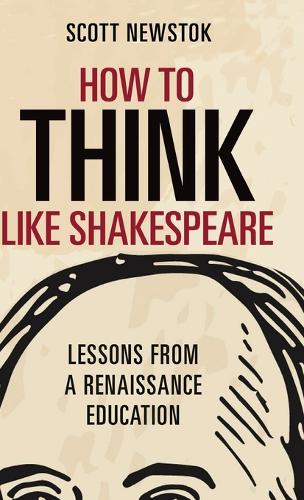
How to Think like Shakespeare: Lessons from a Renaissance Education
(Hardback)
Available Formats
Paperback
Published: 1st September 2020
Hardback
Published: 30th June 2020
Paperback
Published: 8th November 2021
Publishing Details
How to Think like Shakespeare: Lessons from a Renaissance Education
By (Author) Scott Newstok
Princeton University Press
Princeton University Press
30th June 2020
United States
Classifications
General
Non Fiction
Moral and social purpose of education
Literary studies: plays and playwrights
Literary studies: c 1600 to c 1800
153.42
Physical Properties
Hardback
200
Width 140mm, Height 216mm
Description
A lively and engaging guide to vital habits of mind that can help you think more deeply, write more effectively, and learn more joyfully
How to Think like Shakespeareoffers an enlightening and entertaining guide to the craft of thought one that demonstrates what we've lost in education today, and how we might begin to recover it. In fourteen brief, lively chapters that draw from Shakespeare's world and works, and from other writers past and present, Scott Newstok distills vital habits of mind that can help you think more deeply, write more effectively, and learn more joyfully, in school or beyond.
Challenging a host of today's questionable notions about education, Newstok shows how mental play emerges through work, creativity through imitation, autonomy through tradition, innovation through constraint, and freedom through discipline. It was these practices, and a conversation with the past not a fruitless obsession with assessment that nurtured a mind like Shakespeare's. And while few of us can hope to approach the genius of the Bard, we can all learn from the exercises that shaped him.
Written in a friendly, conversational tone and brimming with insights,How to Think like Shakespeareenacts the thrill of thinking on every page, reviving timeless and timely ways to stretch your mind and hone your words.
Reviews
"One of the Times Literary Supplement's Books of the Year 2020"
"Finalist for the PROSE Award in Literature, Association of American Publishers"
"Shortlisted for the Parnassus Prize, Memoria College"
"Clever. . . . An incisive commentary on the pitfalls of contemporary American education. . . . A smart and valuable new book."---Daniel Blank, Los Angeles Review of Books
"A wonderful new book."---Martha Barnette, public radio's A Way with Words
"Newstok argues persuasively for a return to some of the pedagogical methods that proved so effective in the 1500s."---Paul Muldoon, Times Literary Supplement
"With crisp, lapidary prose, Newstok writes authoritatively about the educational norms and practices that helped shape Shakespeares mind. . . . As Newstok essays the contours of a Renaissance education, he demonstrates with verve the effect its had on his own thinking. Put otherwise, the book is Newstoks essay at thinkingand its a sterling attempt. . . . It will be of interest to any reader or teacher of Shakespeareand it should be of interest to any serious reader or teacher. Watching Newstok think with Shakespeare is inspiring, and he proves an amiable guide."---Nathan M. Antiel, Principia:A Journal ofClassicalEducation
"Eminently sensible. . . . An emphatic appreciation of just how valuable the pedagogical insights of four centuries ago remain today."---David McInnis, Australian Book Review
"Even in giving concrete, practical advice, Newstok displays a flexible virtuosity; he is a practiced craftsman at home in the workshop of language."---Joshua P. Hochschild, First Things
"A delightful book. . . . Intelligent, perceptive, readable, useful."---Matthew Stewart, University Bookman
Author Bio
Scott Newstok is professor of English and founding director of the Pearce Shakespeare Endowment at Rhodes College. A parent and an award-winning teacher, he is the author of Quoting Death in Early Modern England and the editor of several other books. He lives in Memphis, Tennessee.
